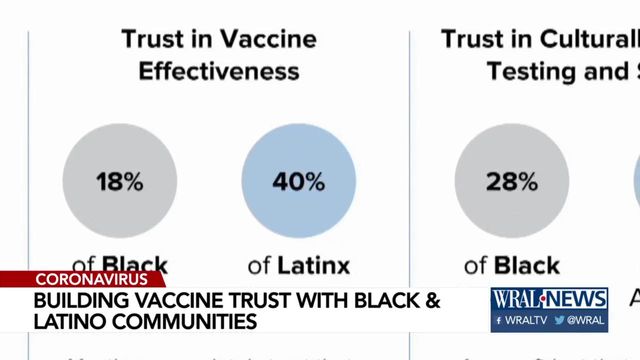A coronavirus vaccine has been approved. But how many people will actually get it?
Pfizer's coronavirus vaccine won approval from the Food and Drug Administration on Friday. Now, the race is on to get the vaccine to people across the country.
Posted — UpdatedPfizer's coronavirus vaccine has now been authorized for emergency use by the Food and Drug Administration. Now, the race is on to get the vaccine to people across the country.
Amid a frightening surge in COVID-19 that promises a bleak winter across the country, the challenge for health authorities is to figure out what it will take to make people trust the shots that Dr. Anthony Fauci, the top U.S. infectious-disease expert, calls the light at the end of the tunnel.
Rachel Roper, associate professor of Microbiology and Immunology at East Carolina's Body School of Medicine was on a team working to accelerate a vaccine for the SARS virus. She said will "definitely" take a coronavirus vaccine, once it is made available to her.
"This was based on decades of research and knowledge that we already have, so it's not a rush job," Roper said.
"As more and more people get it, and show that it is safe, I think people will come around," Roper said.
Fauci told the New York Times he plans to "get vaccinated publicly, in the public space, so that people can see me getting vaccinated,” as soon as “the vaccine becomes available to me.”
President-elect Joe Biden said on Friday that the American public should have confidence in a coronavirus vaccine that may soon begin to become available.
Arguing that “there is no political influence” in the vaccine, Biden stressed the scientific research that has “led us to this point.” He also reiterated his “bold and doable” commitment to trying to vaccinate 100 million Americans in the first 100 days of his administration.
Of the virus, Biden said, “We can wish this away, but we need to face it.”
Among those who don’t want to get vaccinated, about 3 in 10 said they aren’t concerned about getting seriously ill from the coronavirus, and around a quarter said the outbreak isn’t as serious as some people say. Roper said that the risk of getting coronavirus far outweighs the risk of taking a vaccine.
"Compared to the threat of coronavirus, getting COVID-19, it's a clear win for the vaccine," she said.
• Credits
Copyright 2024 by WRAL.com and the Associated Press. All rights reserved. This material may not be published, broadcast, rewritten or redistributed.






